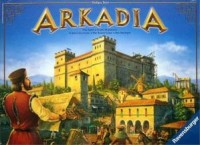
Arkadia
2-4
1013+
45+
In a remote land there lies a region with undulating hills and fertile valleys. Widely-travelled settlers have laid the foundation stone for the city of Arkadia. In addition to several other buildings, they want to construct a magnificent castle on a hill.
Four wealthy families –the cloth merchants, the spice merchants, the carpenters and the silversmiths – want to enhance prestige and augment their influence. For this reason, they compete for the major contribution to the castle’s construction. Players act as architects. The four families commission them to plan and realize the build-up of the town and the castle.
User Reviews (1)
Add a Review for "Arkadia"
You must be logged in to add a review.

Arkadia is a strategy board game for 2-4 players set in medieval times. In Arkadia, players assume the role of architects; they are responsible for the construction of the city as well as the castle. For their efforts, they are rewarded gold by the 4 wealthy families that reside in the land of Arkadia. The completion of the castle (whose construction advances gradually, along with the city) signals the end of the game. After one last scoring round is carried out, players count their accumulated gold; the wealthiest one is the winner.
Gameplay overview
The game is based on tile placement for the most part, but good timing is a very important aspect of it as well. It offers a substantial level of strategy and so even demanding strategy gamers are likely to appreciate. The existence of cards and the element of luck, which, however, is light compared to the strategic part. Memorization also is quite important, for remembering the seals opposing players have gathered (the seals player have are kept hidden after they are dealt) will very likely affect one’s decision when it comes to adding parts to the castle.
Players take turns in a structured order. In a turn, one must either place one of the 8 different buildings on the board, or assign some workers to work on completing an already placed building instead (when a building tile is placed on the board, it is in an ‘under construction’ state). Whenever a building is complete, all players that participate in its construction gain seals of the same color and symbol as the family to which the particular building belongs. These seals can be exchanged for gold during various stages of the game. The exchange value can greatly vary, as it is directly relevant to the state of the castle.
As an optional move, a player can use a banner to gather additional workforce and exchange some, or all of the seals he/she has collected up to that point, if desired.
The game components are significant in variety and number, featuring a rather elegant design, although not extraordinarily nice. That sets a fair atmosphere to it; to my opinion, it is acceptably enticing; I would like it if it was a little more pronounced though.
The game board is divided into many squares by a grid that serve as possible placement areas for the buildings. The castle, located at the center of the game board, begins as a 2D representation, but at the game advances, it evolves in an interesting manner by the addition of plastic pieces with different symbols on top of them. As for the buildings, they are represented by card-board components with detailed and accurate illustrations upon them (on both sides). Their shape and even size varies a lot, depending on the type of building and the correct placement of them is a key tactical element that will greatly influence how well a player will do during the game.
A game lasts for about 1 hour. Even though good performance matter throughout its entire duration, the last few turns will usually make a stronger impact on the final outcome. Consequently, the suspense and interest of the game escalate towards the final stages.
Pros:
+ Average difficulty in learning to play
+ Considerable amount of strategy and tactics
+ Interesting combination of components
+ Requires good timing skills and memorization
+ Interest increases gradually as game progresses.
Cons:
– The atmosphere is slightly weak.
– The beginning of the game unfolds in a somewhat random manner.